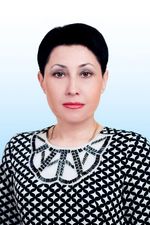 | Natalya Sosnickaya
Pages in this Program
Bio Natalya Sosnickaya Doctor of Pedagogical sciences, professor The Headmaster of Department of Higher Mathematics and Physics Dmytro Motornyi Tavria State Agrotechnological University Melitopol, Ukraine ORCID 0000-0001-6329-768X Basic higher education: I have graduated with honors from the faculty: - general technical disciplines of Berdyansk State Pedagogical Institute. P.D. Osipenko in 1991 in the specialty "general technical disciplines and physics" and received the qualification of a teacher of general technical disciplines and physics. - Physical-mathematical and technological education of Berdyansk State Pedagogical University (BSPU) in 2016 in the specialty "Mathematics" and received the qualification of mathematician. Mathematics teacher. Computer science teacher. In 2017 I have graduated from the BSPU with a master's degree and obtained the following qualifications: higher education degree Master's degree; received a diploma with honors in "Mathematics (mathematical modeling)", specialization in computer science, professional qualification Mathematician. Teacher of mathematics. Teacher of mathematics and computer science. Academic status: Academic titles of associate professor (2002) and professor (2011) were awarded to the Department of Physics and Methods of Teaching Physics in the specialty 13.00.02 - Theory and Methods of Teaching (Physics). Degree: Candidate of Pedagogical Sciences since 1999. Dissertation topic "Improvement of educational experiment in wave optics by means of new information technologies". Doctor of Pedagogical Sciences since 2009. The topic of the dissertation is “Formation and development of the content of school physical education in Ukraine (historical and methodological context)”. Research interests: • study of the formation and development of the content of physical education in Ukraine (historical and methodological context); • systematic multilevel forecasting of the development of the content of physical and mathematical education by the method of mathematical description and time series; • use of information and communication technologies in the educational process in physics; • current issues of vocational education.
|